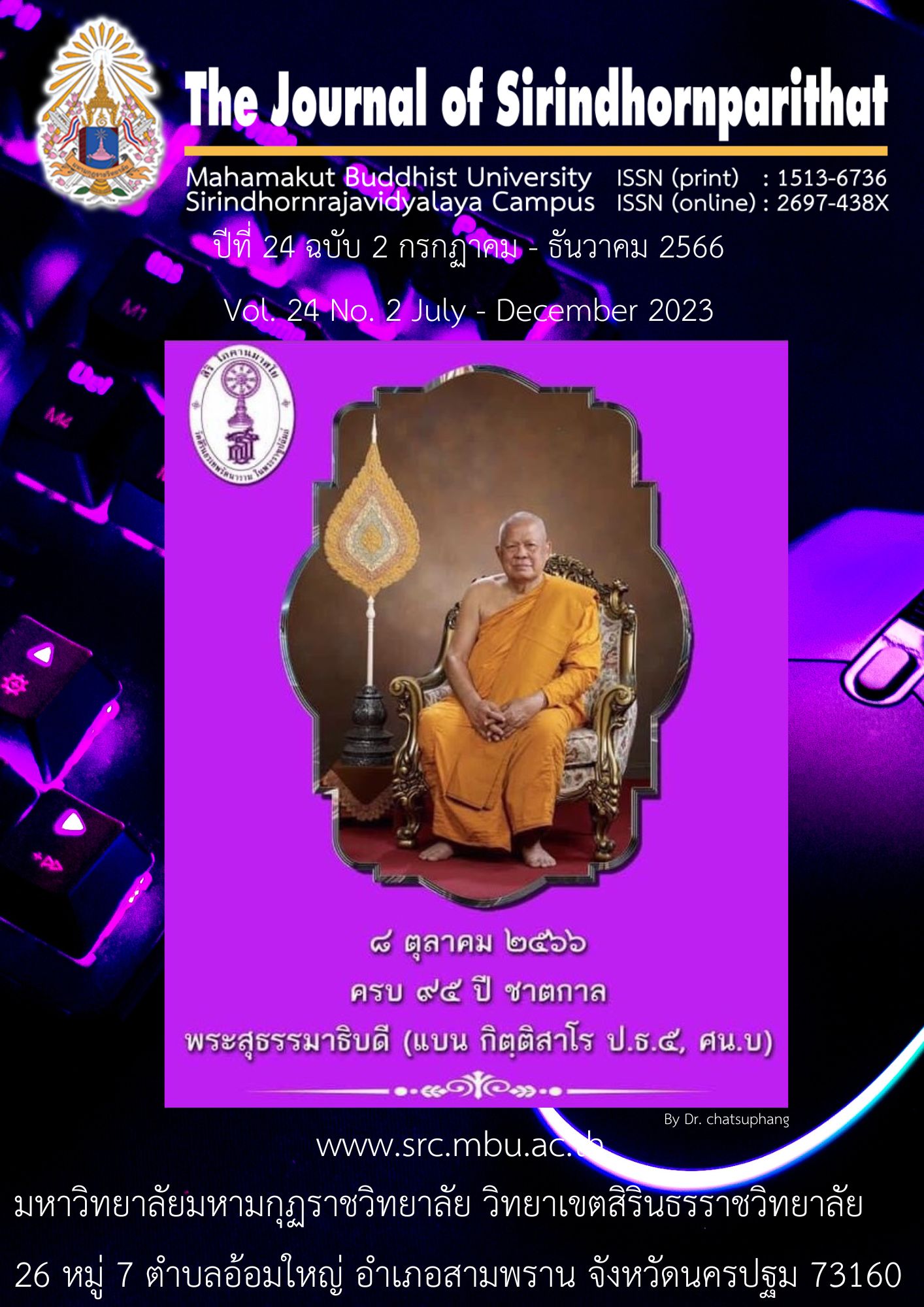E-Learning teaching and learning for improvement to keep up with changes in the 21st century
Keywords:
The instructional management, Improvement, TransformationAbstract
At present, the world and Thailand have to face the spread of the Coronavirus (COVID-19) causing various educational institutions to be affected by the spread of the virus. Educational institutions have used online teaching. It is a teaching and learning management tool. The purposes of this research were to 1. compare learning outcome of fourth year students of faculty of Social Sciences, Program in Government, Before-and-after study 2. study level of satisfaction to the instructional management using e-learning for transformation in 21st century 3. study problem and cause of the instructional management using e-learning for transformation in 21st century.
This is action research, then populations were fourth year students 20 persons of faculty of Social Sciences, Program in Government and studying in field experience training subject (SO 2141) semester 1 in academic year 2565. The instrument was a questionnaire and interview form. Reliability 0.95 and statistics were frequency percentage average and standard deviation. The results of the research were as follows:
1. The target group 20 persons, most are male 60 % status as a layman 90 % and under 30 years old 70 % understanding field experience training subject (SO 2141) in the instructional management using e-learning, before study had Average rating 6.35 about 31.5 % and after study had Average rating 14.65 about 73.25 %, had score increase
2. The target group 20 persons, studying in field experience training subject (SO 2141) had identified the problem and Cause that haven’t knowledge base and understanding about this subject or have a little knowledge but don’t practice, irresponsible, lack of enthusiasm in studying and Lack of readiness of school supplies, so cause of class problems are lack of understanding in content of subject, don't interest to study, Lack of practice and Lack of readiness of school supplies
3. student had satisfaction of the instructional management using e-learning in field experience training subject (SO 2141) over all in a high level.
References
กรมสุขภาพจิต. (10 11 2563). เทรนด์พฤติกรรมแบบ New Normal กับชีวิตวิถีใหม่ของคนไทย. (ออนไลน์). สืบค้น 8/8/2564จาก https://www.dmh.go.th/covid19/.: https://www.dmh. go.th/ covid19/.
จิตรา สุขเจริญ. (2654). สืบค้น 5/11/64 จาก http://164.115.41.60/ knowledge: http://164.115.41. 60/ knowledge.
เดือนเพ็ญ บุญมาชู. (2564). ผลของการจัดการเรียนการสอนด้วย e-Learning ต่อผลสัมฤทธิ์ทางการเรียนของนักศึกษา ในรายวิชาการพยาบาลเด็กและวัยรุ่น 1 คณะพยาบาลศาสตร์ มหาวิทยาลัยอุบลราชธานี. วารสารศูนย์อนามัยที่ 9. 15(37) : 352-364
พาสนา จุลรัตน. (2561). การจัดการเรียนรู้สำหรับผู้เรียนในยุคThailand 4.0. ฉบับภาษาไทย สาขามนุษยศาสตร์ สังคมศาสตร์ และศิลปะ. 11(2) : 2363-2380.
ล้วน สายยศ และอังคณา สายยศ. (2538). เทคนิคการวิจัยทางการศึกษา. กรุงเทพมหานคร: สุวีริยาสาส์น.
สายใจ ทองเนียม. (2560). การพัฒนาสื่อบทเรียนอิเล็กทรอนิกส์ (E-Learning) วิชาภาษาวรรณคดี (THA 234). วารสารมนุษยศาสตร์และสังคมศาสตร์. มหาวิทยาลัยรังสิต. 13(1) : 1513-4563.
สิริรัตน์ ช่อฉาย. (2564). ศึกษาพฤติกรรมชีวิตวิถีใหม่ของนักเรียนในช่วงสถานการณ์ COVID-19. วารสารวิชาการมนุษยศาสตร์และสังคมศาสตร์. เข้าถึงได้จาก https://thailand-property-: https://thailand-property-.
สุพัชชา คงเมือง และดวงพร โสมสุข (2563). การพัฒนาสื่อออนไลน์เพื่อเสริมทักษะการสอบภาษาอังกฤษ RMUTSV Test. วารสารวิชาการการประยุกต์ใช้เทคโนโลยีสารสนเทศ. 6(1) : 19-28.
สำนักงานคณะกรรมการการอุดมศึกษา. (2548). อีเลิร์นนิง: จากทฤษฎีสู่การปฏิบัติ e-Learning: from theory to practice. สืบค้นเมื่อวันที่ 26 พฤศจิกายน 2563 จากโครงการมหาวิทยาลัยไซเบอร์ไทย Thailand Cyber University Project : www.thaicyberu. go.th.

Downloads
Published
Issue
Section
License
Copyright (c) 2023 Mahamakut Buddhist University

This work is licensed under a Creative Commons Attribution-NonCommercial-NoDerivatives 4.0 International License.
บทความที่ได้รับการตีพิมพ์เป็นลิขสิทธิ์ของ มหาวิทยาลัยมหามกุฏราชวิทยาลัย วิทยาเขตสิรินธรราชวิทยาลัย
ข้อความที่ปรากฏในบทความแต่ละเรื่องในวารสารวิชาการเล่มนี้เป็นความคิดเห็นส่วนตัวของผู้เขียนแต่ละท่านไม่เกี่ยวข้องกับหาวิทยาลัยมหามกุฏราชวิทยาลัย วิทยาเขตสิรินธรราชวิทยาลัย และคณาจารย์ท่านอื่นๆในมหาวิทยาลัยฯ แต่อย่างใด ความรับผิดชอบองค์ประกอบทั้งหมดของบทความแต่ละเรื่องเป็นของผู้เขียนแต่ละท่าน หากมีความผิดพลาดใดๆ ผู้เขียนแต่ละท่านจะรับผิดชอบบทความของตนเองแต่ผู้เดียว



